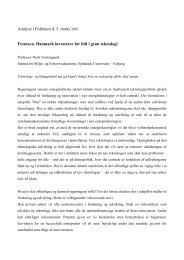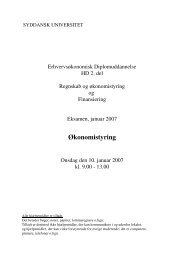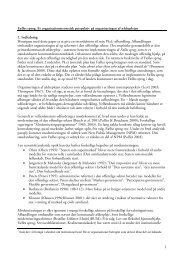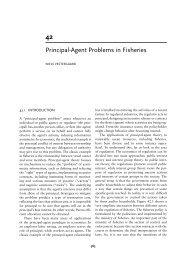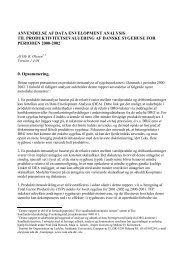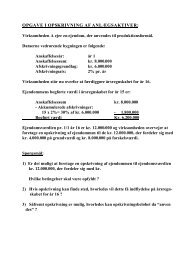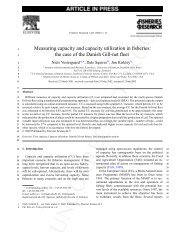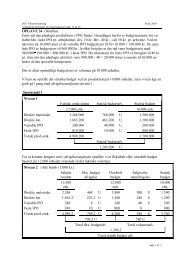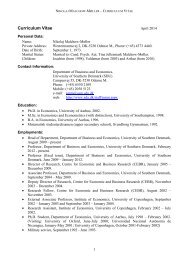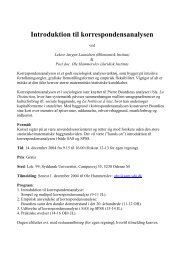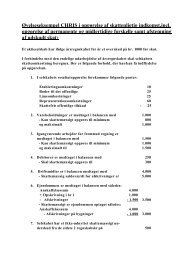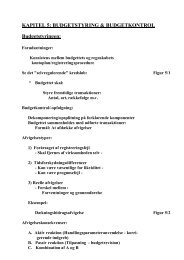Development of Parties and Party Systems in ... - lah@sam.sdu.dk
Development of Parties and Party Systems in ... - lah@sam.sdu.dk
Development of Parties and Party Systems in ... - lah@sam.sdu.dk
- No tags were found...
You also want an ePaper? Increase the reach of your titles
YUMPU automatically turns print PDFs into web optimized ePapers that Google loves.
“This provisional situation characterized by a rich dynamic <strong>of</strong> social problems, together with anunbalanced <strong>and</strong> chan<strong>in</strong>g distribution <strong>of</strong> ga<strong>in</strong>s <strong>and</strong> losses. The result<strong>in</strong>g conflicts become- <strong>in</strong>successful cases- part <strong>of</strong> the universe myth. In thus universe <strong>of</strong> myth these conflicts are seen as aseries <strong>of</strong> crisis/tests, which push the society <strong>in</strong>directly from the old order to the new. This orig<strong>in</strong>allyopen transition comes to a close when the participants cease to see the current events asprovisional ”(Kabele, 1999).In the words <strong>of</strong> George Schöpfl<strong>in</strong> (Schöpfl<strong>in</strong>, 1993), the first stage was marked by weak<strong>in</strong>stitutionalisation, lack <strong>of</strong> confidence among people, atomization <strong>of</strong> civil society, a desire forideologisation <strong>of</strong> all <strong>in</strong> society <strong>and</strong> a widespread resistance aga<strong>in</strong>st politics as such (“antipolitics”).The new politicians were forced to take far-reach<strong>in</strong>g decisions under high <strong>in</strong>security <strong>and</strong> timepressure. In such unsettled times social preferences <strong>and</strong> visions <strong>of</strong> the new society were imprecise<strong>and</strong> vague. Under those circumstances the characteristics <strong>of</strong> identity politics <strong>and</strong> moral politics werestrik<strong>in</strong>g.Later, mov<strong>in</strong>g towards “ord<strong>in</strong>ary” <strong>in</strong>terest based politics the political life became more predictable,<strong>and</strong> the prospects <strong>of</strong> membership <strong>of</strong> the EU became realistic <strong>and</strong> not only considered as publicgoods but public necessities as well, thereby constitut<strong>in</strong>g a “valens issue”, i.e. issues on which allthe relevant <strong>and</strong> responsible parties, the post-communist parties <strong>in</strong>cluded, declare the sameobjective but dispute each other’s competence <strong>in</strong> achiev<strong>in</strong>g the desired policy” (Innes, 2002:90).The tabula rasa account that accentuates the uniqueness <strong>and</strong> fluidity <strong>and</strong> chaotic environment <strong>of</strong> thefirst stage <strong>of</strong> post-communism, seems to be most appropriate to use when study<strong>in</strong>g the first“extraord<strong>in</strong>ary” stage <strong>of</strong> post-communism. New concepts had to be developed to capture the newpost-communist situation, as the parties <strong>and</strong> party-systems <strong>in</strong> the first years under post-communismshowed qualitatively specific “extraord<strong>in</strong>ary”characteristics that dist<strong>in</strong>guished them from the West-European. At the outset the situation was historically unique <strong>and</strong> “extraord<strong>in</strong>ary”. As can be seen <strong>in</strong>the list <strong>of</strong> concepts <strong>and</strong> dynamics (figure ) new concepts, reflect<strong>in</strong>g the unique historical situationhad to be used.Figure : Stages <strong>of</strong> post-communism. ..... “someth<strong>in</strong>g else”.Late stage <strong>of</strong> …… the “break-through” …. Extraord<strong>in</strong>ary ......real socialism politics ……….. ord<strong>in</strong>ary politicstransition anomie......... consolidation <strong>of</strong> democracy3



